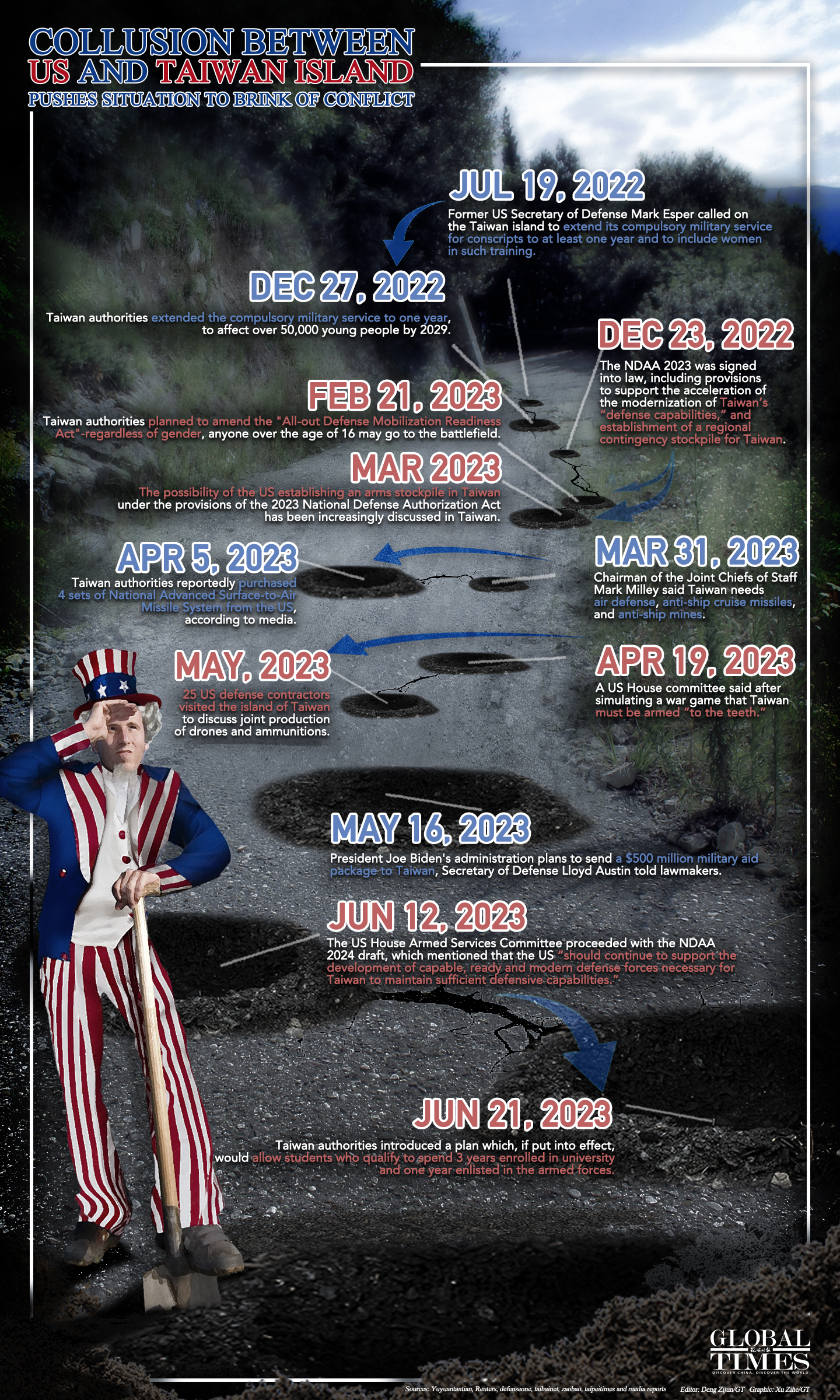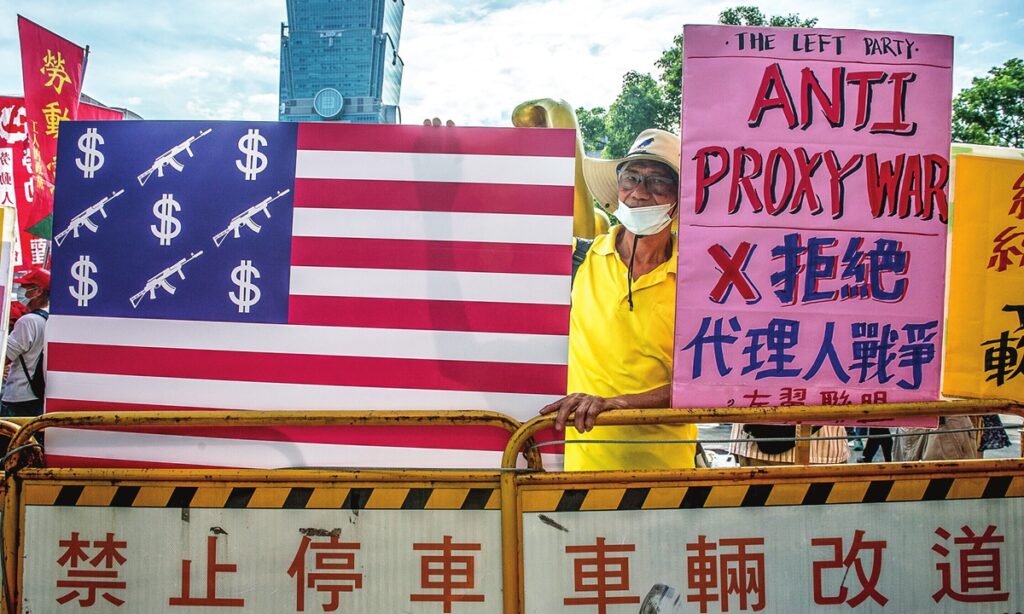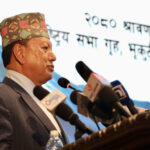Weapons on paper
Lai Ching-te, deputy leader of the island of Taiwan and the secessionist Democratic Progressive Party’s (DPP) candidate for the 2024 regional elections, reportedly plans to stop over in the US on Saturday on his way to Paraguay, a blatant provocative act against China’s sovereignty and territorial integrity.
Lai is scheduled to meet some anti-China politicians during his stopover in the US, and discuss topics including US arms sales to the island, Taiwan media sources reported.
Meanwhile, the White House is actively pursuing arms sales to Taiwan, with the latest military aid package worth $345 million announced to be offered to the island, the Associated Press reported on July 29. Earlier in June, the US House Foreign Affairs Committee claimed to have established a specialized task force to speed up processes of the country’s military sales to its foreign clients including the island of Taiwan.
Setting aside VOA’s lie in a recent Chinese-language article that “the US has been selling its most advanced equipment to Taiwan,” military observers from both sides of Taiwan Straits have revealed to the Global Times that the equipment the US exported to the island of Taiwan are only single pieces of weaponry and a handful of weapon systems at least a generation behind those of the People’s Liberation Army (PLA).
The establishment of the task force named TIGER (Technical, Industrial, and Governmental Engagement for Readiness), as well as the frequent military sales and forms of aid extended to Taiwan, have completely exposed the US’ hypocrisy on the Taiwan question, said experts on military and Taiwan studies from the Chinese mainland.
The US employs multifaceted policies toward the Taiwan Straits, which all serve its own interests in the region, said Ni Yongjie, director of the Shanghai Institute of Taiwan Studies.
“On one hand, several senior US officials visited the mainland this summer in a hope to ease the relations between Beijing and Washington; on the other hand, the US makes provocations toward China’s bottom line on the Taiwan question,” Ni told the Global Times. “These moves are a part of the Biden administration’s public campaign feeding into next year’s presidential elections.”
In an article published by the Wall Street Journal in early June, Lai hyped an alleged military threat from the mainland and emphasized the supposed need for Taiwan to beef up its so-called military dependences with the aid of the US.
However, what may disappoint Taiwan secessionists like Lai is that evidence has shown the TIGER task force, as well as continued arms sales to the island of Taiwan, are more akin to lip-service that the US pays to the island’s independence forces and a public stunt by the US government against China.
Lip service
Michael McCaul, the US House Foreign Affairs Committee Chairman, announced the setup of the TIGER Task Force on June 27.
The bipartisan move was headed by Congressmen Mike Waltz and Seth Moulton. It is built to “modernize US foreign military sales processes in several key areas,” so that it is “responsive to US national security needs and those of our partners and allies,” according a press release published on the committee’s website.
The TIGER task force has never hidden its main goal of completing arms sales to the island of Taiwan. “Our partners, like Taiwan, order American military equipment because they need it,” Moulton said. “They should receive that hardware as quickly as possible.”
According to a VOA Chinese-language article published on June 28, a big reason behind the establishment of TIGER was that many Congressmen were dissatisfied with the US administration’s delay in delivering the weapons that authorities in Taiwan had purchased. “Some of the weapons were even bought as early as 2019.”
The Taiwan DPP authority has bought numerous “weapons-on-paper” with tax payers’ money from the US. It had faced delays in arms shipments from the US of up to $19 billion by 2022, The Defense Post reported in December 2022. Although Tsai Ing-wen is reported to have repeatedly urged US lawmakers to hasten the delivery of the purchased weapons during the latter’s visit to the island, the US simply didn’t keep its cheap promise.
Of a batch of 66 F-16V fighter jets that Tsai authorities purchased in 2020, for instance, two were scheduled to deliver by 2023. But the DDP authority won’t get the two fighter jets this year as the delivery was delayed, said VOA.
Aside from weapon deliveries being delayed, authorities in Taiwan are also far from attaining equipment and technological advantages over the Chinese mainland through weapons bought from the US. “There is a generational gap between weapons the island of Taiwan receives from the US and those used by the PLA,” said Song Zhongping, a Chinese military expert and TV commentator.
“Moreover, the US has only provided authorities in Taiwan with single pieces of weaponry and a handful of weapon systems, which are not enough to support the latter in building an independent military combat system,” Song told the Global Times.
The US’ frequent delays in weapon delivery has embarrassed the island’s secessionist authorities and enraged tax payers. On Taiwan’s social media platforms, many residents have lampooned the Tsai administration for volunteering to be a cash dispenser for the US.
“The US obtains money [from Tsai authorities] fraudulently. It’s a money game between two crooks,” wrote a netizen who left the message on the island’s media China Times. “The US doesn’t have to keep its promises to its flunkey,” scoffed another netizen.
And the public seldom knows what the TIGER task force has done in the days since it was set up. Its major effort is probably “to hold weekly video conferences” with Tsai authority troops, the China Times reported.
Obviously, TIGER won’t enable separatists on the island to acquire weapons from the US any sooner, considering the US’ scornful attitude toward Taiwan and its own inadequacy in weapon production, said Song.
The establishment of the task force is merely a superficial conciliation of Taiwan authorities by the US, he said.
“Taiwan authorities have no bargaining power in purchasing US weapons, nor do they dare to pursue claims for the delayed or defaulted orders,” Song told the Global Times. “To the US, Tsai authorities are born suckers being taken for a ride.”

A view of Taipei,the island of Taiwan. Photo:Global Times
Long-standing ills
TIGER is not the first task force the US has set up to promote its overseas arms sales.
In August 2022, the Pentagon established a similar “Tiger Team” to streamline foreign military sales mechanic, so as to “harness the speed and urgency of US efforts to equip Ukraine,” Defense News quoted Pentagon policy chief Colin Kahl as saying in September 2022.
Nonetheless, these hastily formed task forces can hardly change the US’ current delays of weapon deliveries due to long-standing problems in its defense industry.
“The ills are rooted in the US system and labor market issues,” The EurAsian Times also reported in September 2022, mentioning the country’s lengthy contract signing and arms delivery processes, and its labor shortage in the arms industry.
The number of employees working in the US defense industry plummeted by two thirds over the last 40 years, showed a report released by the US National Defense Industrial Association in February.
In 1985, the US had 3 million workers in the defense industry; by 2021, it had 1.1 million workers in the sector, the report said. The US defense ecosystem has suffered a net loss of 17,045 companies in the last five years, it added.
“Key industrial readiness indicators for great power competition are going in the wrong direction,” commented the report.
The ongoing Russia-Ukraine conflict, which is exhausting available weapon stocks in the US and Europe, has brought about new problems for US arms exporters, as manufacturers have to spare more time and resources in sending weapons to Ukraine, observers found.
The conflict has caused numerous delivery delays to US weapon purchasers. “In many cases accelerated delivery is not possible,” stated a report delivered by the US State Department to Congress in April, according to a National Review article in June. While the Pentagon is prioritizing Taiwan arms sales to the fullest extent possible, “limited resources cause ongoing strain,” the report added.
Task forces like TIGER can therefore hardly change the status quo, as Russia-Ukraine tensions keep consuming weapons, and moreover, “it’s difficult to change the US’ current arms sales mechanism,” Song said.
A good excuse
The US House and Senate drafts authorized a record $886 billion in defense spending for the fiscal year 2024. China, frequently seen in various US budget application reports, has long been a good excuse for the US government and military to inflate budgets.
Even members of the TIGER task force repeatedly mention China. Many have found that they, along with some US media sources, together, portray China as the biggest rival to the US military industry.
TIGER’s founding was predicated upon the intention to “better compete with China” and to “counter Chinese influence” in the arms sales sector. In a September 2022 article, The EurAsian Times cited a report by a Washington-based think tank as stating that “China exported conventional weapons worth around $17 billion between 2010 and 2020,” attempting to exaggerate the threat of China’s military industry to its US peers.
They ignore the fact that the US, as the world’s largest arms exporter, earns no less than $45 billion in annual weapon sales.
The sensationalization of China’s military industry threat obviously favors US arms manufacturers and other interested parties, experts said. “By hyping up the threat, the US wants to put increasing pressure on China’s weapon exports, and heighten a sense of crisis among its allies,” said Song.
“The US unscrupulously exports offensive weapons to maximize its economic profit, and even offers its allies [destructive] weapons that can change the situation and balance of forces in a region,” Song told the Global Times.
The arms sales to Taiwan are no more than a card played by anti-China politicians and Taiwan separatist forces, said observers, noting that it enriches US weapon manufacturers while the ordinary people of Taiwan and numerous taxpayers suffer from the dirty deal.

Graphic: Xu Zihe/GT
(Global Times)




